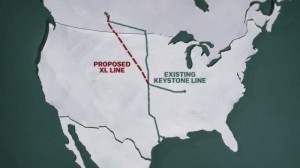Its Back!
As a direct result of the fall out from the mid term election in the United States last November, the United States Senate will vote this week on legislation to oblige the government to approve The Keystone XL pipeline which will connect the Alberta tar sands with the Gulf Coast and finally allow Canada to export the oil produced there.
According to Fox news, which has its own agenda, the vote is part of a cynical effort of the Democrats to give a Louisiana Senator the opportunity to vote in favour of the bill which President Obama will veto in any case.
In my view, the pipeline is that it is a terrific example of how business can get caught up in very complex local, national and even international politics and once a project or a specific proposal is “in play” it can get seriously bogged down or even stopped.
Pipeline or Lightning Rod?

The project itself is relatively straight forward and involves completing the fourth phase of the Keystone network and this phase involves the president as it crosses the U.S. Canadian Border and thus requires special approval.
From the point of view of the pro-business political leadership of North Dakota and other Northern States through which the pipeline will cross the issues are jobs, construction contracts, and better infrastructure which can potentially be used by the regions own, relatively small oil industry.
Opposition comes from two sources. One concern over the route and risks associated with pipeline operations as the original proposed route went through an environmentally sensitive region in Nebraska called the Sand Hills, which is the largest sand dune complex in the western Hemisphere and the thought was that the construction of the pipeline would impact the areas ecosystem and a potential accident could cause enormous damage and even contaminate the Ogallala aquifer which supplies much of the water in that part of the country.
The other issue is that making oil out of tar sands is considered by most environmentalists as a seriously bad idea as the production of the oil reportedly creates 17% more CO2 than conventional oil and that the world should focus on energy efficiency and renewables rather than pursue this technology.
Both sides of the issue have elevated the rhetoric well past the point of no return making the pipeline a test of good v.s. evil for both sides of the debate and my guess is that Transcanda, a pipeline and energy company with $5billion of renewable energy assets was caught off guard by the controversy and enormous delay.
Environmental Interest Groups
Opposition to the Keystone project also illustrates very well the three types of environmental interest groups that are active in today’s world.
Opposing Keystone XL are very local groups who oppose the project for the very specific impact it might have on a local community or ecosystem. These groups are increasingly becoming more influential through their use of social media which amplifies their message and allows them to connect to to other such groups.
Keystone XL has also attracted opposition from classical conservation organisations such as the Sierra Club whose primary interest has been historically to protect wilderness areas such as the Sand Hills from any kind of development. These groups are very effective at working with existing legislation such as the rules of the environmental protection agency to block or at least tie up projects they see as threatening.

Finally, Keystone XL is also opposed by activists such as Greenpeace and 350.org who oppose the Canadian Tar Sand operation out of principal and essentially will do anything to stop or slow down its development.
Perhaps the most telling example of the stakes perceived in Keystone XL is the Sierra Club’s president, Michael Brune breaking with 120 years of Sierra Club precedent to join more activists organisations in civil disobedience on the issue!
No way out for Obama
With Rhode Island Senator Sheldon Whitehouse and the entire environmental movement on one side and the new republican majority on the other, I’m afraid the President will have no choice but to veto the bill and continue to delay or block the project whatever the facts.

